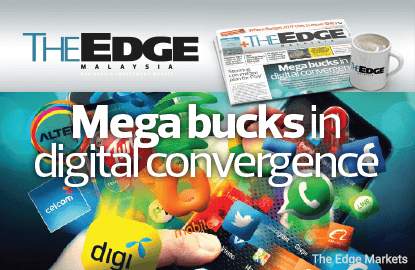
KUALA LUMPUR (Oct 29): In today's digital age, change is the only definite that we deal with in a world of increasingly indefinite possibilities.
While consumers get new opportunities for work and play, workers are having to change their mindset and pick up new skills, especially those with jobs that are at risk of being taken over by machines. Businesses too are being forced to transform.
But digital innovation is not just about making people’s lives better and creating new ways of doing business. Nor is it just the telecoms and technology industries’ opportunity to rejuvenate sales and profit as they strive to win and keep customers.
"What’s at stake is a country’s ability to remain competitive as the world undergoes the Fourth Industrial Revolution, which Professor Klaus Schwab, founder and executive chairman of the World Economic Forum (WEF), says goes beyond automating production and is characterised by the fusion of technologies that is blurring the lines between the physical, digital and biological worlds," wrote The Edge Malaysia editor Cindy Yeap in the publication's latest cover story, 'Mega bucks in digital convergence', for the week of Oct 31-Nov 6.
Still, at the forefront of this new digitisation wave are telecommunication companies (telcos), who have spent billions in the past 20 years building the network infrastructure for faster internet connection on the go.
And they are faced with a quandary now that mobile phone penetration rates are well above 100% and billions of dollars in lucrative long-distance phone calls and text messages are almost history — thanks to over-the-top (OTT) applications like WhatsApp, Skype and FaceTime that essentially piggyback on the telecoms network without spending to build them.
In 2014, operators around the world reportedly lost US$14 billion in revenue because of a decline in voice and traditional messaging traffic.
In the face of this, the choice is clear: telcos can either stay as a “dumb pipe” and continue providing the basic network or smarten up and build new business advantages to seize growth opportunities in the digital space, including moving into adjacent service industries such as advertising, e-commerce and content delivery.
Axiata Group Bhd, for one, is allocating 2% to 5% of its total investment each year into digital service investments, according to its president and CEO Tan Sri Jamaludin Ibrahim. And Axiata isn't the only local telco investing for the future.
“We have a solid track record in moving fast and smart ahead of every industry cycle, and have an ambition to take a stronger position in the daily digital lives of our customers,” DiGi.Com Bhd CEO Albern Murty said, adding that “significant” investments are being made to deliver new digital services to enrich the user experience.
Over at Maxis Bhd, group CEO Morten Lundal said the company “took a big step” towards new ways of working and digitalisation for businesses with its Vodafone partnership to offer enterprises world-leading IoT solutions to create smarter, more efficient businesses. “We are not basing our future on non-traditional income… We will continue to develop our capabilities as we evolve to digitalise Maxis,” he said.
Strong initiatives have also been taken by “convergence champion” Telekom Malaysia Bhd (TM), whose units have been chosen by at least Malaysian Resources Corp Bhd (MRCB) and Aspen Group to deploy connectivity and IoT smart solutions at selected real estate developments towards delivering that enhanced digital lifestyle for more Malaysians. Its unit, VADS Lyfe Sdn Bhd, for example, is also working with Cyberview Sdn Bhd on an IoT-based traffic-light system in Cyberjaya to help cut waiting time and improve traffic flow.
Still, fine as their current digitisation initiatives may be, Malaysia is not among the top innovative countries in the world with digital successes this year. According to the World Economic Forum (WEF), it is nowhere near Finland, Sweden, Norway, Singapore, Switzerland, the US and the Netherlands, where the WEF found a high rate of business ICT adoption as well as a top innovation environment.
Based on the Networked Readiness Index 2016 in the WEF’s Global Information Technology Report, Malaysia was ranked 31st of 139 (32nd of 143 in 2015) with 4.9 points versus 5.6 to 6 points for the top 15 countries, the weekly wrote.
But Malaysia took the first place when it comes to “internet and telephony competition”, which could mean more pressure on local operators to provide better services for less money. Will this nudge industry consolidation?
In a related story titled 'Are conditions ripe for another Malaysian mega merger?', the weekly looks deeper into the possibilities.
"A potential merger between billionaire Ananda Krishnan’s pay-TV and content behemoth Astro Malaysia Holdings Bhd and mobile telecoms operator Maxis has periodically been the subject of speculation based on their common shareholding and the billionaire’s deal-making skills. Ananda and his associates control 64.9% of Maxis and 40.98% of Astro," it wrote.
A remarriage of Telekom and Axiata has also been talked about since Telekom added mobile services to its fold with the acquisition of P1. The latter is set to compete with other mobile operators, including Axiata’s Celcom. Khazanah Nasional Bhd owns 28.7% of Telekom and 37.8% of Axiata.
Khazanah also owns 20.7% of Astro, which is why deals involving Telekom and Astro have also been bandied about. Some have gone so far as to speculate that Telekom’s mobile arm could be carved out for Axiata and the rest merged with Astro.
“Much depends on what the shareholder [Khazanah or Ananda] wants to achieve,” one seasoned regional telecoms analyst comments. “If the shareholder really wanted to do the deal, there will be merits.”
To find out what the companies themselves have to say about whether a mega merger is in the cards, pick up a copy of The Edge Malaysia today at newsstands near you.
P/S: Yes, The Edge Malaysia can also be downloaded from Apple's AppStore and Androids' Google Play.
Save by subscribing to us for your print and/or digital copy.
P/S: The Edge is also available on Apple's AppStore and Androids' Google Play.